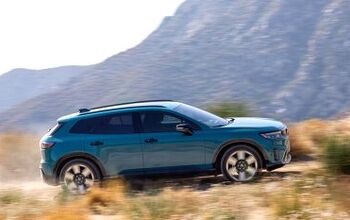New York Times: Gas Tax Better Than Cash for Clunkers
Huh. And there I was thinking that The New York Times was pro-Cash for Clunkers. Now that all’s said and done (well, done), the paper slates the government program as . . . wait for it . . . inefficient. (Well, they did call for a “well-designed” program.) Post-mortem, the Gray Lady does the math. “On average, cars are driven 12,000 miles per year, according to government statistics. Considering that the traded-in clunkers had an average fuel economy of 15.8 m.p.g. while the new ones deliver 24.9 m.p.g., a swap saved some 278 gallons of gas per year — which would have released almost 2.8 tons of carbon dioxide when burned. Assuming the clunkers would have been driven four more years, the $4,200 average rebate removed 11.2 tons of carbon from the atmosphere, at a cost of some $375 per ton. If they would have been driven five years, the carbon savings cost $300 per ton. And if drivers drive their sleek new wheels more than they drove their old clunkers, the cost of removing carbon from the atmosphere will be even higher.” So how does that compare with the Times’ new red-headed, planet-cooling stepchild?
To put this in perspective, an allowance to emit a ton of CO2 costs about $20 on the European Climate Exchange. The Congressional Budget Office estimated that a ton of carbon would be valued at $28 under the cap-and-trade program in the clean energy bill passed by the House in June.
TTAC’s tackled this issue before (coincidentally enough), but it’s news to the Times. And rather than crunch some more numbers, the paper calls for a national gas tax—again, still—and calls it good.
The best tool to induce Americans to drive more fuel-efficient cars would be a gas tax that provided rebates for low-income drivers. Another, though inferior, alternative — if Congress couldn’t face the political risks of a gas tax — would be a program that provided a rebate for drivers of clean cars while imposing a fee on drivers of gas hogs.
In any case, as environmental policy, it’s just too expensive to buy clunkers to take them off the road.
So now you tell us.
More by Robert Farago
Latest Car Reviews
Read moreLatest Product Reviews
Read moreRecent Comments
- Slavuta I don't know how they calc this. My newest cars are 2017 and 2019, 40 and 45K. Both needed tires at 30K+, OEM tires are now don't last too long. This is $1000 in average (may be less). Brakes DYI, filters, oil, wipers. I would say, under $1500 under 45K miles. But with the new tires that will last 60K, new brakes, this sum could be less in the next 40K miles.
- BeauCharles I had a 2010 Sportback GTS for 10 years. Most reliable car I ever own. Never once needed to use that super long warranty - nothing ever went wrong. Regular maintenance and tires was all I did. It's styling was great too. Even after all those years it looked better than many current models. Biggest gripe I had was the interior. Cheap (but durable) materials and no sound insulation to speak of. If Mitsubishi had addressed those items I'm sure it would have sold better.
- Marty S I learned to drive on a Crosley. Also, I had a brand new 75 Buick Riviera and the doors were huge. Bent the inside edge of the hood when opening it while the passenger door was open. Pretty poor assembly quality.
- 3-On-The-Tree Alan, I was an Apache pilot and after my second back surgery I was medically boarded off of flying status due to vibrations, climbing on and off aircraft, so I was given the choice of getting out or re-branching so I switched to Military Intel. Yes your right if you can’t perform your out doesn’t matter if your at 17 years. Dad always said your just a number, he was a retired command master chief 25 years.
- ToolGuy "Note that those vehicles are in direct competition with models Rivian sells"• I predict that we are about to hear why this statement may not be exactly true


































Comments
Join the conversation
geeber: Not sure where you are getting your facts, but it is scientifically incontrovertible that industrialization has pushed global temperatures up above the expected trend. Check these graphs:http://www.pbs.org/wgbh/warming/etc/graphs.html#2